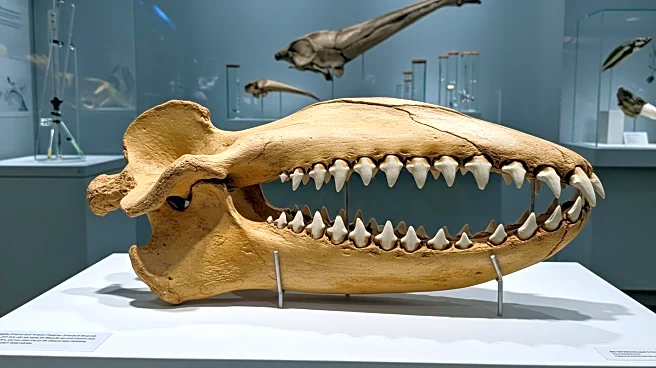What's Happening?
Researchers have identified a new species of ancient whale, Janjucetus dullardi, from fossils found in southeastern Australia. This species, dating back approximately 26 million years, is one of the earliest known relatives of modern baleen whales. Unlike its filter-feeding descendants, J. dullardi was equipped with large eyes and razor-sharp teeth, suggesting a predatory lifestyle. The discovery was made by Ross Dullard, a school principal, who found the fossils at Half Moon Bay near Melbourne in 2019. The fossils were part of the Jan Juc Marl geological formation, which is known for yielding significant paleontological finds. The research team, led by Ruairidh Duncan, used advanced imaging techniques to analyze the fossils, confirming the species as a juvenile or subadult mammalodontid whale.
Why It's Important?
The discovery of Janjucetus dullardi provides valuable insights into the evolutionary history of whales, particularly the transition from predatory to filter-feeding species. This find enriches the understanding of mammalodontids, a family of small whales that lived in warm, shallow waters during the Oligocene Epoch. The research highlights southeastern Australia as a significant site for paleontological discoveries, with potential for further findings that could reshape knowledge of marine life evolution. The study underscores the importance of public contributions to scientific research, as exemplified by Dullard's donation of the fossils to Museums Victoria.
What's Next?
Researchers anticipate more discoveries in the Jan Juc Marl formation, which could further illuminate the evolutionary pathways of ancient marine mammals. The study of J. dullardi may lead to a reevaluation of the ecological roles played by early whales and their adaptations to prehistoric marine environments. Continued exploration in southeastern Australia is expected to yield additional fossil evidence, potentially revealing new species and expanding the understanding of whale evolution.











